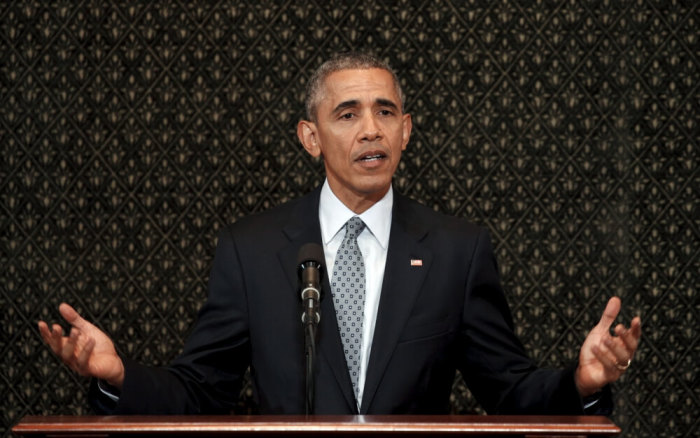Obama: 'I'm Not Responsible for Donald Trump, Crackup, Circus of Republicans'

President Barack Obama has responded to arguments that push-back against the White House administration is what is behind the rise of Donald Trump, the controversial Republican presidential candidate who is leading in the delegates race.
"I have been blamed by Republicans for a lot of things ... but being blamed for their primaries and who they're selecting for their party is novel," Obama told CBS News at the White House Rose Garden on Thursday.
"What you're seeing within the Republican Party, is to some degree, all of those efforts over a course of time creating an environment where somebody like a Donald Trump can thrive," he added.
Trump, a billionaire businessman with no previous political experience, has taken the GOP race by storm and is leading in the delegates count, but has been strongly criticized by his rivals and the political establishment of divisive speech, such as calling on a ban on all Muslims coming to America.
Some Republicans, such as former Louisiana Gov. Bobby Jindal, have suggested that the popularity of Trump was born out of pushback against Obama.
In an article for the Wall Street Journal last week, Jindal, who dropped out of the Republican race last year, noted that throughout American history, the characters of newly elected presidents have often stood in sharp contrast to those of their predecessors.
"After seven years of the cool, weak and endlessly nuanced 'no drama Obama,' voters are looking for a strong leader who speaks in short, declarative sentences. Middle-class incomes are stagnant, and radical Islam is on the march across the Middle East. No wonder voters are responding to someone who promises to make America great again," Jindal wrote.
In his speech on Thursday Obama insisted, however, that one of his main goals has always been to unite the American people.
"What I'm not going to do is to validate some notion that the Republican crackup that's been taking place is a consequence of actions that I've taken," the president declared, calling on Republicans to "do some introspection" and figure out what has allowed "the circus that we've been seeing to transpire."
On the Democratic side, Obama again refused to endorse either of the two main candidates for the presidential nomination, Hillary Clinton and Bernie Sanders.
"My most important role will be to make sure when primaries are done I'm bringing everyone together so we can focus on winning the general election," he added.
While Trump has stirred a number of different controversies in his speeches, one of the main focuses of Thursday's CNN debate in Miami centered on his stance on Islam. Trump defended his suggestions that Islam is a religion that stokes hatred, and claimed that "virtually 100 percent" of mosques are radical.
Florida Sen. Marco Rubio, one of his presidential rivals, argued that such rhetoric endangers the safety of others, pointing to Christian missionaries in Bangladesh that he met who told him that their work environment is hostile precisely because of American politicians' comments that are critical of Islam.
"Their safety and security very much relies upon friendly Muslims that live alongside them, that may not convert, but protect them and certainly look out for them. And their mission field really are Muslims that are looking to convert to Christianity as well," Rubio said.
"And they tell me that today they have a very hostile environment in which to operate in because the news is coming out that in America, leading political figures are saying that America doesn't like Muslims. So this is a real impact."




























